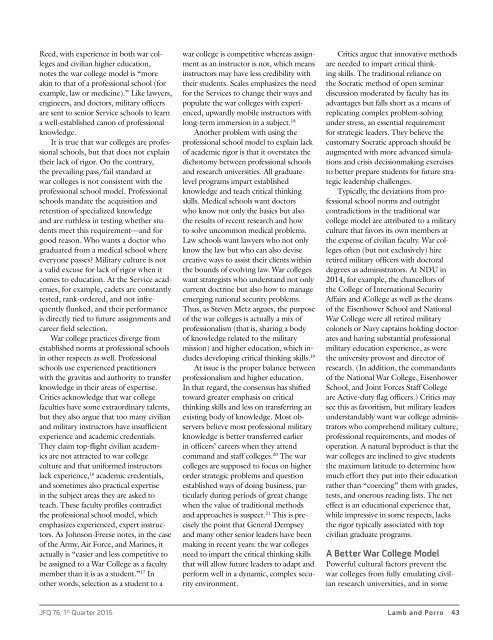jfq-76
jfq-76
jfq-76
Create successful ePaper yourself
Turn your PDF publications into a flip-book with our unique Google optimized e-Paper software.
Reed, with experience in both war colleges<br />
and civilian higher education,<br />
notes the war college model is “more<br />
akin to that of a professional school (for<br />
example, law or medicine).” Like lawyers,<br />
engineers, and doctors, military officers<br />
are sent to senior Service schools to learn<br />
a well-established canon of professional<br />
knowledge.<br />
It is true that war colleges are professional<br />
schools, but that does not explain<br />
their lack of rigor. On the contrary,<br />
the prevailing pass/fail standard at<br />
war colleges is not consistent with the<br />
professional school model. Professional<br />
schools mandate the acquisition and<br />
retention of specialized knowledge<br />
and are ruthless in testing whether students<br />
meet this requirement—and for<br />
good reason. Who wants a doctor who<br />
graduated from a medical school where<br />
everyone passes? Military culture is not<br />
a valid excuse for lack of rigor when it<br />
comes to education. At the Service academies,<br />
for example, cadets are constantly<br />
tested, rank-ordered, and not infrequently<br />
flunked, and their performance<br />
is directly tied to future assignments and<br />
career field selection.<br />
War college practices diverge from<br />
established norms at professional schools<br />
in other respects as well. Professional<br />
schools use experienced practitioners<br />
with the gravitas and authority to transfer<br />
knowledge in their areas of expertise.<br />
Critics acknowledge that war college<br />
faculties have some extraordinary talents,<br />
but they also argue that too many civilian<br />
and military instructors have insufficient<br />
experience and academic credentials.<br />
They claim top-flight civilian academics<br />
are not attracted to war college<br />
culture and that uniformed instructors<br />
lack experience, 16 academic credentials,<br />
and sometimes also practical expertise<br />
in the subject areas they are asked to<br />
teach. These faculty profiles contradict<br />
the professional school model, which<br />
emphasizes experienced, expert instructors.<br />
As Johnson-Freese notes, in the case<br />
of the Army, Air Force, and Marines, it<br />
actually is “easier and less competitive to<br />
be assigned to a War College as a faculty<br />
member than it is as a student.” 17 In<br />
other words, selection as a student to a<br />
war college is competitive whereas assignment<br />
as an instructor is not, which means<br />
instructors may have less credibility with<br />
their students. Scales emphasizes the need<br />
for the Services to change their ways and<br />
populate the war colleges with experienced,<br />
upwardly mobile instructors with<br />
long-term immersion in a subject. 18<br />
Another problem with using the<br />
professional school model to explain lack<br />
of academic rigor is that it overstates the<br />
dichotomy between professional schools<br />
and research universities. All graduatelevel<br />
programs impart established<br />
knowledge and teach critical thinking<br />
skills. Medical schools want doctors<br />
who know not only the basics but also<br />
the results of recent research and how<br />
to solve uncommon medical problems.<br />
Law schools want lawyers who not only<br />
know the law but who can also devise<br />
creative ways to assist their clients within<br />
the bounds of evolving law. War colleges<br />
want strategists who understand not only<br />
current doctrine but also how to manage<br />
emerging national security problems.<br />
Thus, as Steven Metz argues, the purpose<br />
of the war colleges is actually a mix of<br />
professionalism (that is, sharing a body<br />
of knowledge related to the military<br />
mission) and higher education, which includes<br />
developing critical thinking skills. 19<br />
At issue is the proper balance between<br />
professionalism and higher education.<br />
In that regard, the consensus has shifted<br />
toward greater emphasis on critical<br />
thinking skills and less on transferring an<br />
existing body of knowledge. Most observers<br />
believe most professional military<br />
knowledge is better transferred earlier<br />
in officers’ careers when they attend<br />
command and staff colleges. 20 The war<br />
colleges are supposed to focus on higher<br />
order strategic problems and question<br />
established ways of doing business, particularly<br />
during periods of great change<br />
when the value of traditional methods<br />
and approaches is suspect. 21 This is precisely<br />
the point that General Dempsey<br />
and many other senior leaders have been<br />
making in recent years: the war colleges<br />
need to impart the critical thinking skills<br />
that will allow future leaders to adapt and<br />
perform well in a dynamic, complex security<br />
environment.<br />
Critics argue that innovative methods<br />
are needed to impart critical thinking<br />
skills. The traditional reliance on<br />
the Socratic method of open seminar<br />
discussion moderated by faculty has its<br />
advantages but falls short as a means of<br />
replicating complex problem-solving<br />
under stress, an essential requirement<br />
for strategic leaders. They believe the<br />
customary Socratic approach should be<br />
augmented with more advanced simulations<br />
and crisis decisionmaking exercises<br />
to better prepare students for future strategic<br />
leadership challenges.<br />
Typically, the deviations from professional<br />
school norms and outright<br />
contradictions in the traditional war<br />
college model are attributed to a military<br />
culture that favors its own members at<br />
the expense of civilian faculty. War colleges<br />
often (but not exclusively) hire<br />
retired military officers with doctoral<br />
degrees as administrators. At NDU in<br />
2014, for example, the chancellors of<br />
the College of International Security<br />
Affairs and iCollege as well as the deans<br />
of the Eisenhower School and National<br />
War College were all retired military<br />
colonels or Navy captains holding doctorates<br />
and having substantial professional<br />
military education experience, as were<br />
the university provost and director of<br />
research. (In addition, the commandants<br />
of the National War College, Eisenhower<br />
School, and Joint Forces Staff College<br />
are Active-duty flag officers.) Critics may<br />
see this as favoritism, but military leaders<br />
understandably want war college administrators<br />
who comprehend military culture,<br />
professional requirements, and modes of<br />
operation. A natural byproduct is that the<br />
war colleges are inclined to give students<br />
the maximum latitude to determine how<br />
much effort they put into their education<br />
rather than “coercing” them with grades,<br />
tests, and onerous reading lists. The net<br />
effect is an educational experience that,<br />
while impressive in some respects, lacks<br />
the rigor typically associated with top<br />
civilian graduate programs.<br />
A Better War College Model<br />
Powerful cultural factors prevent the<br />
war colleges from fully emulating civilian<br />
research universities, and in some<br />
JFQ <strong>76</strong>, 1 st Quarter 2015 Lamb and Porro 43




